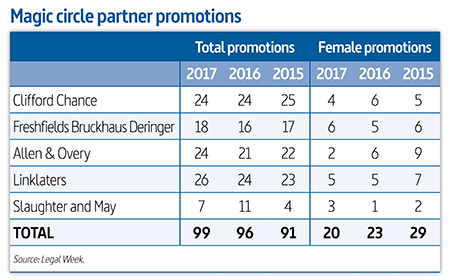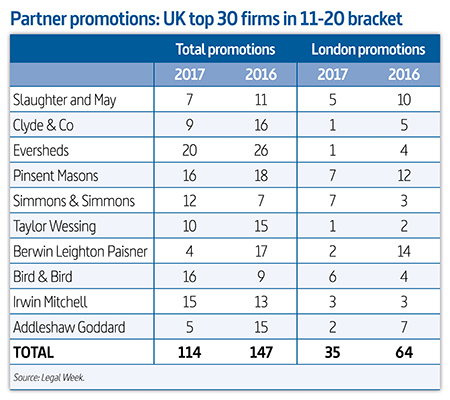Female partner promotions at UK top 30 fall 23% in two years as London sees post-Brexit dip
Diversity drive fails to deliver as Brexit concerns impact London promotion prospects
June 20, 2017 at 12:00 AM
6 minute read
The number of women promoted to partner at the UK's 30 largest law firms has fallen by almost a quarter during the past two years, according to new Legal Week research that also shows firms cutting back on London promotions in the wake of last year's Brexit vote.
One hundred and thirty-four female lawyers have been made up to partner at the 28 UK top 30 law firms to have announced their 2017 promotions so far this year – 23% down on 2015, when 173 women were promoted across the same group of firms.
Never before has the issue of women in law faced so much scrutiny. New partner promotions announcements are instantly dissected for their gender mix and firms are keener than ever to trumpet their efforts to improve diversity. So why, despite these best intentions, are law firms seemingly going backwards on gender diversity?
 The situation looked very different two years ago. The 173-strong cohort of new female partners announced in May 2015 represented a 40% increase on 2014, when just 122 female lawyers were made up.
The situation looked very different two years ago. The 173-strong cohort of new female partners announced in May 2015 represented a 40% increase on 2014, when just 122 female lawyers were made up.
The class of 2015 represented 37% of all partners promoted that year, up from 29% in 2014.
Given the rising number of law firms announcing targets and initiatives to help women succeed in the profession, the logical assumption at that point was the figures would continue to move upwards.
However, the number of new female partners at the UK top 30 dropped 16% to 145 in 2016, representing 31% of all promotions, and this figure has fallen further still this year, with women making up just 30% of new partners at the same group of firms.
 The issue is most pronounced across the magic circle, where female partner promotions are down almost one third on 2015 – from 29 to 20 – despite overall promotion numbers at the elite five firms increasing by almost 10% during the same period.
The issue is most pronounced across the magic circle, where female partner promotions are down almost one third on 2015 – from 29 to 20 – despite overall promotion numbers at the elite five firms increasing by almost 10% during the same period.
Allen & Overy made up just two women this year, the firm's lowest total for three years. Senior partner Wim Dejonghe acknowledges that firms will only make progress on diversity by introducing more accountability for results.
"I've called office managing partners, practice group heads and HR heads directly to ask what their pipelines look like – we are asking them to take ownership of the pipeline that candidates come from, and make those figures accountable," he says. "We have to put driving diversity on the agenda and personal calls with me help emphasise its importance."
Other top firms placing more impetus on partners to take individual responsibility for improving diversity include Herbert Smith Freehills (HSF) and Hogan Lovells, which is planning to incorporate partners' efforts to improve diversity in their pay reviews.
Nineteen of the UK top 30 promoted the same number or fewer female partners this year, including two which made up no women – Berwin Leighton Paisner (BLP) and Addleshaw Goddard. Just five top 30 firms announced partner promotion rounds comprising at least 50% female lawyers this year – Kennedys, Gowling WLG, Charles Russell Speechlys, Stephenson Harwood and Pinsent Masons.
 Pinsents, which made up 11 female lawyers in a 16-strong round this year, has been pushing forward with its 'Project Sky' programme, launched three years ago with the aim of improving gender balance among the partnership.
Pinsents, which made up 11 female lawyers in a 16-strong round this year, has been pushing forward with its 'Project Sky' programme, launched three years ago with the aim of improving gender balance among the partnership.
Employment head Linda Jones (pictured), who leads the initiative, concurs with Dejonghe that backing from senior figures is crucial to ensure diversity efforts have tangible results.
"It is hard to keep people focused, and communicating these things is very difficult, particularly in large, multi-site businesses – especially if it hasn't been driven from the top. It has got to be seen as a strategic imperative of the business; the senior leaders need to make time to walk the talk."
"I am sure it is possible that firms have initiatives and then because there are no instant results, people lose interest in them," she adds.
At Travers Smith, which achieved its first ever all-female promotions round this year, senior partner Chris Hale agrees with regards to the long-term nature of the challenge. "Over the last four to five years we have been encouraging and working with our senior female lawyers on the issues that concern them," he says. "Transactional work in particular makes it difficult to combine working as a mother or a father who bears principal child-rearing responsibility with providing instant service, often at uncongenial hours and short notice to a client.
"If there were an easy solution, someone would have found it already, but there is not – we struggle with it in the same way most other law firms do. It's not, though, for want of people thinking about it."
Meanwhile, following last June's shock referendum result, this year's promotions data suggests UK firms could be reassessing their plans in the capital amid fears over Brexit's long-term impact on London.
Across the top 30, 122 partners were made up in London this year, a drop of 18% on the 148 promoted last year, and the lowest number of City promotions made by the UK top 30 since 2013. This year's London cohort comprised 27% of all partner promotions across the group, down from 32% last year.
Looking at the firms by revenue, this decrease has been driven largely by the top 30 firms in the 11-20 bracket. As a group, those 10 firms made up just 33 partners in London this year, down almost 50% on the 64 promoted in the capital last year.
![]() Firms in this group making significantly fewer London promotions this year include BLP, which made up just two City lawyers after promoting 14 last year; Addleshaw Goddard, which saw London promotions fall from seven last year to two this year; and Clyde & Co, where just one London lawyer was promoted after five were made up last year.
Firms in this group making significantly fewer London promotions this year include BLP, which made up just two City lawyers after promoting 14 last year; Addleshaw Goddard, which saw London promotions fall from seven last year to two this year; and Clyde & Co, where just one London lawyer was promoted after five were made up last year.
DLA Piper global co-chairman Juan Picon (pictured) comments: "If firms rely heavily on City-focused corporate and finance work, they may have seen a decrease in activity in the wake of the Brexit vote, which may in turn have had an impact on who they decide to make up. For us, having such a diverse practice in the UK and our global platform means we are naturally hedged against geopolitical changes such as Brexit."
This content has been archived. It is available through our partners, LexisNexis® and Bloomberg Law.
To view this content, please continue to their sites.
Not a Lexis Subscriber?
Subscribe Now
Not a Bloomberg Law Subscriber?
Subscribe Now
NOT FOR REPRINT
© 2025 ALM Global, LLC, All Rights Reserved. Request academic re-use from www.copyright.com. All other uses, submit a request to [email protected]. For more information visit Asset & Logo Licensing.
You Might Like
View All
KPMG Moves to Provide Legal Services in the US—Now All Eyes Are on Its Big Four Peers

International Arbitration: Key Developments of 2024 and Emerging Trends for 2025
4 minute read
The Quiet Revolution: Private Equity’s Calculated Push Into Law Firms
5 minute read
'Almost Impossible'?: Squire Challenge to Sanctions Spotlights Difficulty of Getting Off Administration's List
4 minute readTrending Stories
- 1'It's Not Going to Be Pretty': PayPal, Capital One Face Novel Class Actions Over 'Poaching' Commissions Owed Influencers
- 211th Circuit Rejects Trump's Emergency Request as DOJ Prepares to Release Special Counsel's Final Report
- 3Supreme Court Takes Up Challenge to ACA Task Force
- 4'Tragedy of Unspeakable Proportions:' Could Edison, DWP, Face Lawsuits Over LA Wildfires?
- 5Meta Pulls Plug on DEI Programs
Who Got The Work
Michael G. Bongiorno, Andrew Scott Dulberg and Elizabeth E. Driscoll from Wilmer Cutler Pickering Hale and Dorr have stepped in to represent Symbotic Inc., an A.I.-enabled technology platform that focuses on increasing supply chain efficiency, and other defendants in a pending shareholder derivative lawsuit. The case, filed Oct. 2 in Massachusetts District Court by the Brown Law Firm on behalf of Stephen Austen, accuses certain officers and directors of misleading investors in regard to Symbotic's potential for margin growth by failing to disclose that the company was not equipped to timely deploy its systems or manage expenses through project delays. The case, assigned to U.S. District Judge Nathaniel M. Gorton, is 1:24-cv-12522, Austen v. Cohen et al.
Who Got The Work
Edmund Polubinski and Marie Killmond of Davis Polk & Wardwell have entered appearances for data platform software development company MongoDB and other defendants in a pending shareholder derivative lawsuit. The action, filed Oct. 7 in New York Southern District Court by the Brown Law Firm, accuses the company's directors and/or officers of falsely expressing confidence in the company’s restructuring of its sales incentive plan and downplaying the severity of decreases in its upfront commitments. The case is 1:24-cv-07594, Roy v. Ittycheria et al.
Who Got The Work
Amy O. Bruchs and Kurt F. Ellison of Michael Best & Friedrich have entered appearances for Epic Systems Corp. in a pending employment discrimination lawsuit. The suit was filed Sept. 7 in Wisconsin Western District Court by Levine Eisberner LLC and Siri & Glimstad on behalf of a project manager who claims that he was wrongfully terminated after applying for a religious exemption to the defendant's COVID-19 vaccine mandate. The case, assigned to U.S. Magistrate Judge Anita Marie Boor, is 3:24-cv-00630, Secker, Nathan v. Epic Systems Corporation.
Who Got The Work
David X. Sullivan, Thomas J. Finn and Gregory A. Hall from McCarter & English have entered appearances for Sunrun Installation Services in a pending civil rights lawsuit. The complaint was filed Sept. 4 in Connecticut District Court by attorney Robert M. Berke on behalf of former employee George Edward Steins, who was arrested and charged with employing an unregistered home improvement salesperson. The complaint alleges that had Sunrun informed the Connecticut Department of Consumer Protection that the plaintiff's employment had ended in 2017 and that he no longer held Sunrun's home improvement contractor license, he would not have been hit with charges, which were dismissed in May 2024. The case, assigned to U.S. District Judge Jeffrey A. Meyer, is 3:24-cv-01423, Steins v. Sunrun, Inc. et al.
Who Got The Work
Greenberg Traurig shareholder Joshua L. Raskin has entered an appearance for boohoo.com UK Ltd. in a pending patent infringement lawsuit. The suit, filed Sept. 3 in Texas Eastern District Court by Rozier Hardt McDonough on behalf of Alto Dynamics, asserts five patents related to an online shopping platform. The case, assigned to U.S. District Judge Rodney Gilstrap, is 2:24-cv-00719, Alto Dynamics, LLC v. boohoo.com UK Limited.
Featured Firms
Law Offices of Gary Martin Hays & Associates, P.C.
(470) 294-1674
Law Offices of Mark E. Salomone
(857) 444-6468
Smith & Hassler
(713) 739-1250










